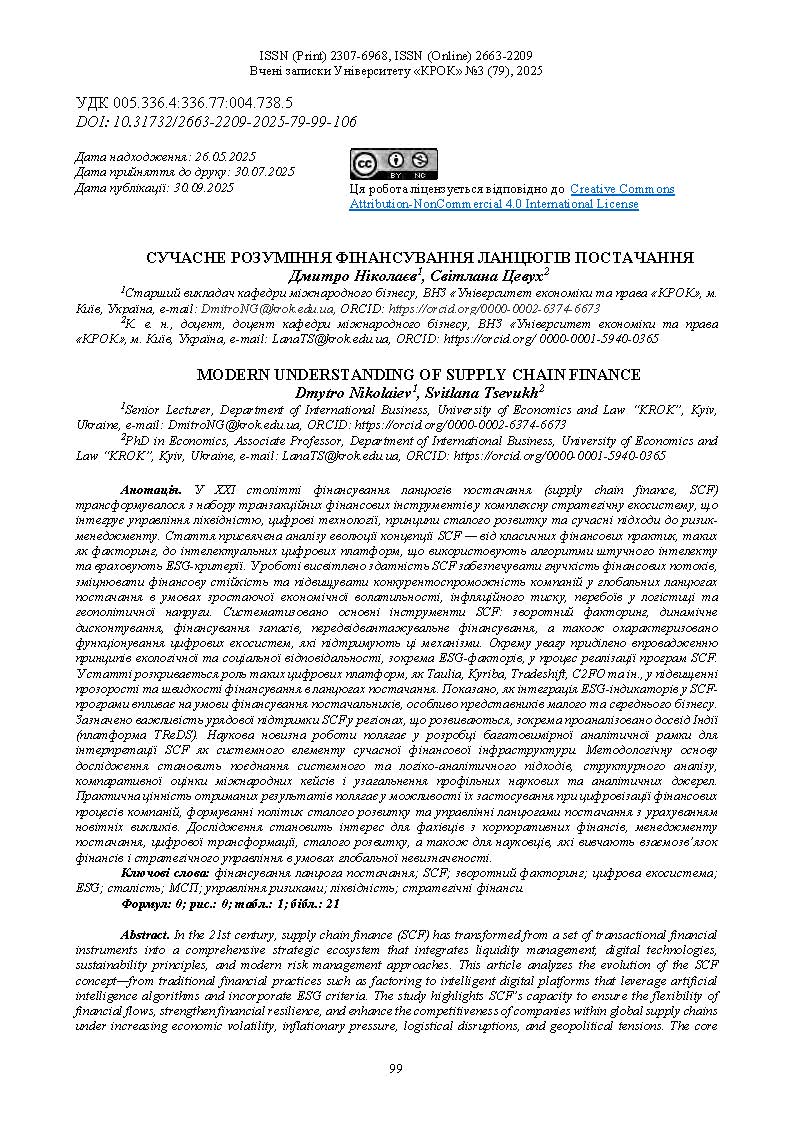СУЧАСНЕ РОЗУМІННЯ ФІНАНСУВАННЯ ЛАНЦЮГІВ ПОСТАЧАННЯ
DOI:
https://doi.org/10.31732/2663-2209-2025-79-99-106Ключові слова:
фінансування ланцюга постачання, SCF, зворотний факторинг, цифрова екосистема, ESG, сталість, МСП, управління ризиками, ліквідність, стратегічні фінансиАнотація
У ХХІ столітті фінансування ланцюгів постачання (supply chain finance, SCF) трансформувалося з набору транзакційних фінансових інструментів у комплексну стратегічну екосистему, що інтегрує управління ліквідністю, цифрові технології, принципи сталого розвитку та сучасні підходи до ризик-менеджменту. Стаття присвячена аналізу еволюції концепції SCF — від класичних фінансових практик, таких як факторинг, до інтелектуальних цифрових платформ, що використовують алгоритми штучного інтелекту та враховують ESG-критерії. У роботі висвітлено здатність SCF забезпечувати гнучкість фінансових потоків, зміцнювати фінансову стійкість та підвищувати конкурентоспроможність компаній у глобальних ланцюгах постачання в умовах зростаючої економічної волатильності, інфляційного тиску, перебоїв у логістиці та геополітичної напруги. Систематизовано основні інструменти SCF: зворотний факторинг, динамічне дисконтування, фінансування запасів, передвідвантажувальне фінансування, а також охарактеризовано функціонування цифрових екосистем, які підтримують ці механізми. Окрему увагу приділено впровадженню принципів екологічної та соціальної відповідальності, зокрема ESG-факторів, у процес реалізації програм SCF. У статті розкривається роль таких цифрових платформ, як Taulia, Kyriba, Tradeshift, C2FO та ін., у підвищенні прозорості та швидкості фінансування в ланцюгах постачання. Показано, як інтеграція ESG-індикаторів у SCF-програми впливає на умови фінансування постачальників, особливо представників малого та середнього бізнесу. Зазначено важливість урядової підтримки SCF у регіонах, що розвиваються, зокрема проаналізовано досвід Індії (платформа TReDS). Наукова новизна роботи полягає у розробці багатовимірної аналітичної рамки для інтерпретації SCF як системного елементу сучасної фінансової інфраструктури. Методологічну основу дослідження становить поєднання системного та логіко-аналітичного підходів, структурного аналізу, компаративної оцінки міжнародних кейсів і узагальнення профільних наукових та аналітичних джерел. Практична цінність отриманих результатів полягає у можливості їх застосування при цифровізації фінансових процесів компаній, формуванні політик сталого розвитку та управлінні ланцюгами постачання з урахуванням новітніх викликів. Дослідження становить інтерес для фахівців з корпоративних фінансів, менеджменту постачання, цифрової трансформації, сталого розвитку, а також для науковців, які вивчають взаємозв’язок фінансів і стратегічного управління в умовах глобальної невизначеності.
Завантаження
Посилання
BCR Publishing. (2023). World Supply Chain Finance Report 2023.
BCR Publishing. (2024). World Supply Chain Finance Report 2024.
European Banking Authority. (2022). Final Report on response to the nonbank lending request from the CfA on digital finance.
European Commission. (2023). EU4Health Programme: Supply Chain Resilience Initiatives.
Factors Chain International. (2024). Annual Review 2024.
Gelsomino, L.M., Mangiaracina, R., Perego, A., & Tumino, A. (2016). Supply Chain Finance: A literature review. International Journal of Physical Distribution & Logistics Management, 46(4), 348–366.
Hofmann, E. (2005): Supply Chain Finance: some conceptual insights. In: Lasch, R./ Janker, C.G. (Hrsg.): Logistik Management - Innovative Logistikkonzepte, Wiesbaden 2005, S. 203-214.
Hofmann, E., & Kotzab, H. (2010). A supply chain-oriented approach of working capital management. Journal of Business Logistics, 31(2), 305–330.
International Chamber of Commerce. (2021). Standards for Sustainable Trade & Sustainable Trade Finance. https://iccwbo.org/wp-content/uploads/sites/3/2021/11/10112021-ICC-Sustainable-Trade-Positioning-Paper-vWeb.pdf
International Finance Corporation (IFC). (2024). MSME Finance Factsheet. https://www.ifc.org/content/dam/ifc/doc/2024/msme-s-factsheet-ifc-financial-institutions-group.pdf
Klapper, L. (2006). The role of factoring for financing small and medium enterprises. Journal of Banking & Finance, 30(11), 3111–3130.
Lamoureux, J.-F., & Evans, T. A. (2011). Supply Chain Finance: A New Means to Support the Competitiveness and Resilience of Global Value Chains.
Levi Strauss & Co. (2022). Financing Supplier Sustainability with HSBC. https://www.levistrauss.com/2022/10/03/financing-supplier-sustainability-with-hsbc/
McKinsey & Company. (2020). Supply-chain finance: A case of convergent evolution.
McKinsey & Company. (2024). Supply chains: Still vulnerable. https://www.mckinsey.com/capabilities/operations/our-insights/supply-chain-risk-survey
PwC. (2020). Rethinking cost to drive value for your organization. https://www.pwc.com/m1/en/services/consulting/documents/rethinking-cost-drive-value-for-your-organisation-vol1.pdf
Reserve Bank of India. (2023). Annual Report 2022-2023. https://www.rbi.org.in/scripts/AnnualReportPublications.aspx?head=Annual%20Report
Unilever. (2025). Partner to Win Program. https://www.unilever.com/suppliers/partner-to-win-programme/
World Economic Forum. (2022). The Global Risks Report 2022. https://www3.weforum.org/docs/WEF_The_Global_Risks_Report_2022.pdf
Wuttke, D., Blome, C., Heese, H.S., & Protopappa-Sieke, M. (2013). Managing the innovation adoption of supply chain finance—Empirical evidence from six European case studies. Journal of Business Logistics, 34(2), 148–166.
Wuttke, David A., Constantin Blome, H. Sebastian Heese, and Margarita Protopappa-Sieke. 2016. Supply chain finance: Optimal introduction and adoption decisions. International Journal of Production Economics 178: 72–81.

Downloads
Опубліковано
Як цитувати
Номер
Розділ
Ліцензія

Ця робота ліцензується відповідно до Creative Commons Attribution-NonCommercial 4.0 International License.

